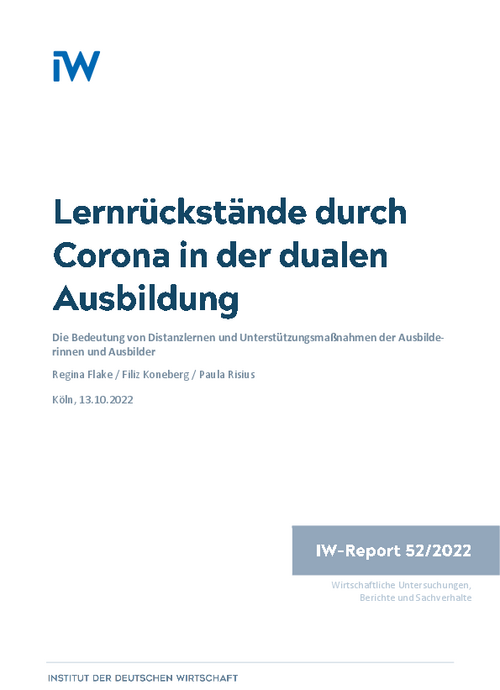The contact reduction measures during the Corona pandemic had a strong impact on everyday life in the German dual system of vocational training. Regarding the work-based training within the companies, the question arises as to which extent distance learning and remote working could be organized at short notice for the apprentices.

Learning deficits due to Corona in dual training

The contact reduction measures during the Corona pandemic had a strong impact on everyday life in the German dual system of vocational training. Regarding the work-based training within the companies, the question arises as to which extent distance learning and remote working could be organized at short notice for the apprentices.
This leads to the question of whether learning losses occurred among apprentices despite the changeover to distance learning. A survey among trainers shows that more than half of the training personnel (55.3 percent) still use distance learning from time to time when it becomes necessary. 8.5 percent even use it strategically to enable young people to collaborate digitally in their day-to-day work.
Due to the lockdowns, distance learning was in many cases used at very short notice and, at least at the beginning of the pandemic, without any preparation time. The survey also covers the question whether the spontaneous switch to distance learning meant that less could be taught and learned. Overall, 71.1 percent of training staff reported learning lags among trainees. The training lags were rarely large (5.7 percent) and mostly small (38.6 percent). Overall, trainees and companies seem to have coped relatively well with the challenges of the crisis.
Furthermore, we analyzed whether there are differences between companies that use digital learning strategically and other companies. No differences are found for medium and small learning lags. They occur equally in all companies, regardless of the strategic use of distance learning. This is different for large learning gaps: trainers who use distance learning strategically are the only group that does not report large learning gaps. However, it must be considered that especially companies with high-performing trainees may have used distance learning strategically. In addition, it is possible that trainers who had already gained experience with distance learning before the pandemic were better able to adapt to the pandemic circumstances. The findings support the hypothesis that it was in particular the unprepared switch to distance learning that led to learning lags rather than digital learning per se.
Even if there are rarely major learning gaps overall, it is important to close apprentices’ knowledge gaps. The results of the survey show that companies spend financial and human resources to ensure the learning success of their apprentices and support them. This is an important signal for the importance of vocational training for securing the skilled workforce in German companies.

Learning deficits due to Corona in dual training

More on the topic

Digital Training: A question of Technology, Resources or Motivation?
The degree to which companies in Germany have digitalised their vocational training, if at all, is influenced by a variety of factors.
IW
Employees in the renewable energy sector: Renaissance of vocational training?
In order to master the ecological transformation of the real economy, many qualified specialists will be needed in the coming years.
IW